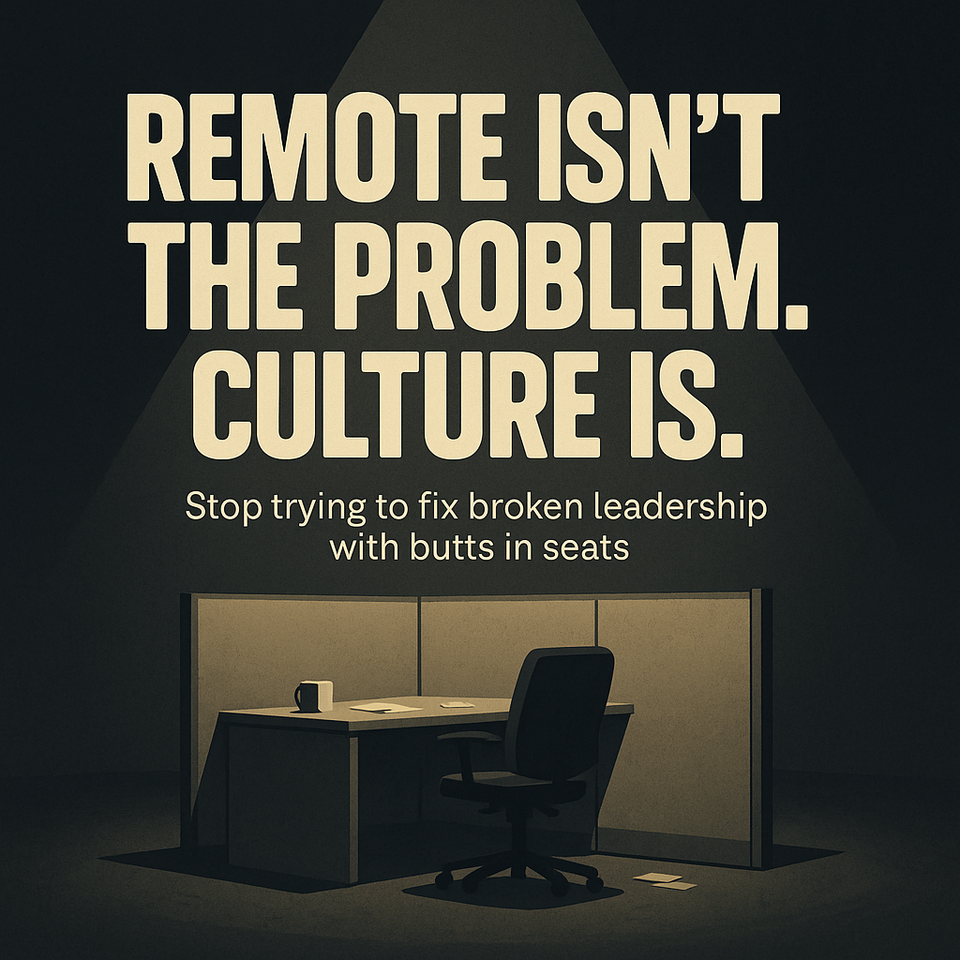Remote Is Not the Problem. Your Culture Is.

Let’s stop pretending.
Remote work didn’t kill your team’s vibe.
Your micromanagement did.
Your endless meetings did.
Your broken culture did.
Remote work just stopped hiding it.
The Excuses Are Getting Old
I’ve heard it all:
- “People just aren’t collaborating the same way…”
- “We’ve lost productivity…”
- “We need to bring everyone back to build culture…”
Translation?
“We don’t know how to lead without control.”
Remote didn’t break your team.
It exposed how fragile your culture really was.
If Your Culture Can’t Survive Remote, It Was Never That Strong
Real talk:
If the only thing holding your team together was a ping-pong table and donuts on Friday, you never had culture, you had perks.
Strong cultures survive distance. They survive time zones. They manage without the daily hallway banter.
Why? Because strong cultures are built on:
- Trust, not surveillance.
- Outcomes, not optics.
- Clarity, not constant check-ins.
- Psychological safety, not proximity.
What’s Actually Failing
You think your team is “disengaged” because they’re remote. But here’s what’s really going on:
- You never built feedback loops that worked without in-person pressure.
- You measured hours, not impact.
- You relied on physical presence to mask your leadership gaps.
- You didn’t trust people to manage their own time, so you made them prove they were “online” instead of doing real work.
Remote didn’t create these problems.
It just made them impossible to ignore.
Remote Work Demands Better Leadership
You can’t manage remote teams with the same tired playbook.
You have to:
- Communicate like it matters.
- Set expectations like an adult.
- Stop policing calendars and start aligning on goals.
- Lead with clarity and consistency—not vibes and Slack availability.
Remote isn’t “less personal.”
If anything, it demands more intention, more empathy, and more clarity than in-office ever did.
What Strong Remote Cultures Actually Do
Let’s flip it. Great remote cultures don’t just survive, they thrive. Here’s what they get right:
- Over-communicate with purpose. They don’t wait for confusion to pile up.
- Celebrate wins loudly. Big or small, they make success visible.
- Document everything. So nothing lives only in someone’s head, or someone’s timezone.
- Give autonomy with accountability. Clear goals, then get out of the way.
- Create space for human connection. Even if it’s just 15 minutes a week, they make time for people to show up as people.
So Stop Blaming Remote
It’s not the webcams. It’s not the time zones. It’s not “Zoom fatigue.”
It’s you.
It’s your culture that needs a rebuild, not your office lease.
Final Word
If you’re still trying to drag everyone back into the office because “we need more collaboration,” let me save you the trouble:
You don’t need an office. You need leadership.
And if you can’t build culture without butts in seats, maybe you never had a culture worth keeping.
Let’s stop making proximity a substitute for purpose.
Lead Don't Ctrl
Hey, since you made it this far, you might actually care about becoming a better leader. Good news: I wrote an ebook that’ll help you skip years of trial and error.



